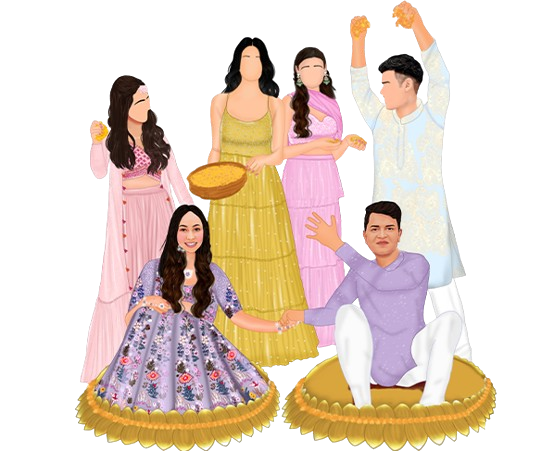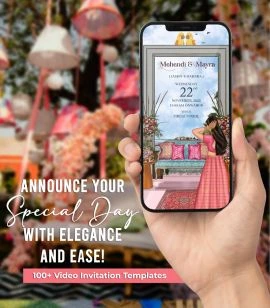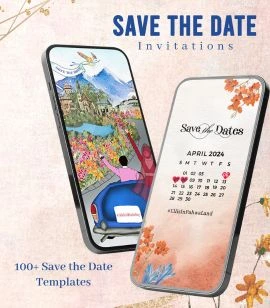Advertisement
By IS Team
Muslim Wedding Cards Wording
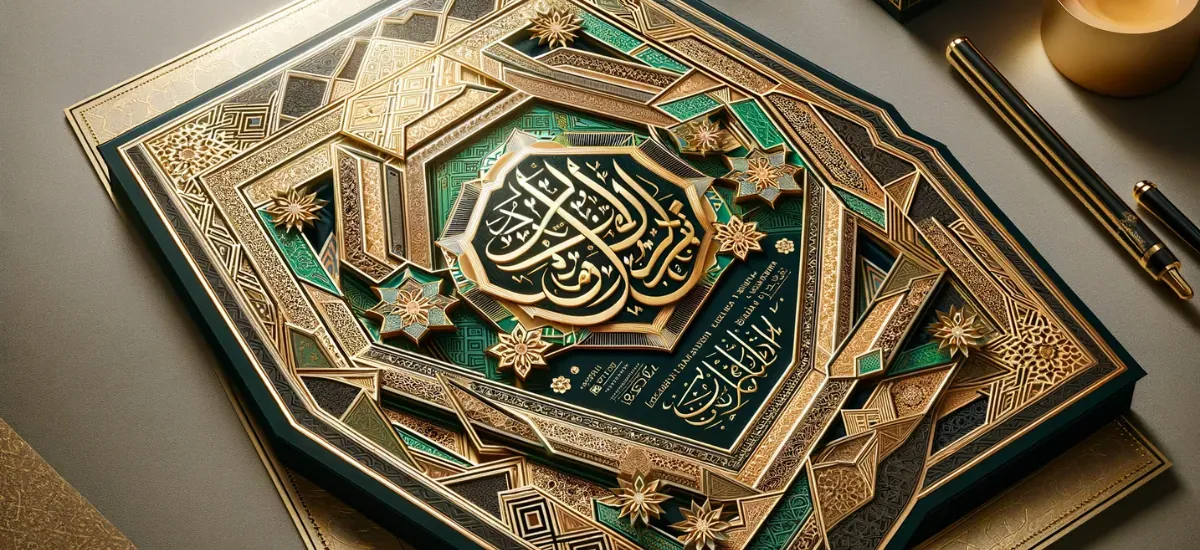
Advertisement
Muslim wedding card wordings are a unique amalgamation of tradition, faith, and linguistic elegance, reflecting the sanctity of marriage in Islam. These invitations are marked by a tone of deep respect and solemnity, often adorned with Arabic calligraphy and enriched with Quranic verses or Islamic poetry.
The language is a blend of spiritual and cultural elements, with phrases like "Bismillah-ir-Rahman-ir-Rahim" setting a tone of divine grace. The wording is not just informative but also a prayer, wishing the couple a blessed union. It embodies the reverence for marriage as a divine covenant, capturing the essence of a lifelong commitment in the eyes of Allah, making these invitations more than mere announcements – they are a celebration of sacred union.
Basic Elements of a Muslim Wedding Card

Advertisement
1. Mention Islamic Phrases
Incorporate phrases like "Bismillah-ir-Rahman-ir-Rahim" (In the name of Allah, the Most Gracious, the Most Merciful) to invoke blessings, and "Barakallahu Lakuma" (May Allah bless you both) as a prayer for the couple's happiness and prosperity. These expressions add a spiritual and traditional essence to the wedding card.
2. Names of the Bride and Groom
Clearly state the names of the bride and groom, often preceded by their parents' names, to show respect and family lineage.
3. Names of Parents and Grandparents
Including the names of parents and grandparents honors family heritage and pays homage to ancestral roots.
4. Date and Time of the Wedding
Mention the specific date and time of the wedding, adhering to Islamic calendar dates if applicable.
5. Venue Details
Provide clear venue details, including address and specific instructions if the location has religious significance.
Islamic Phrases and Their Significance
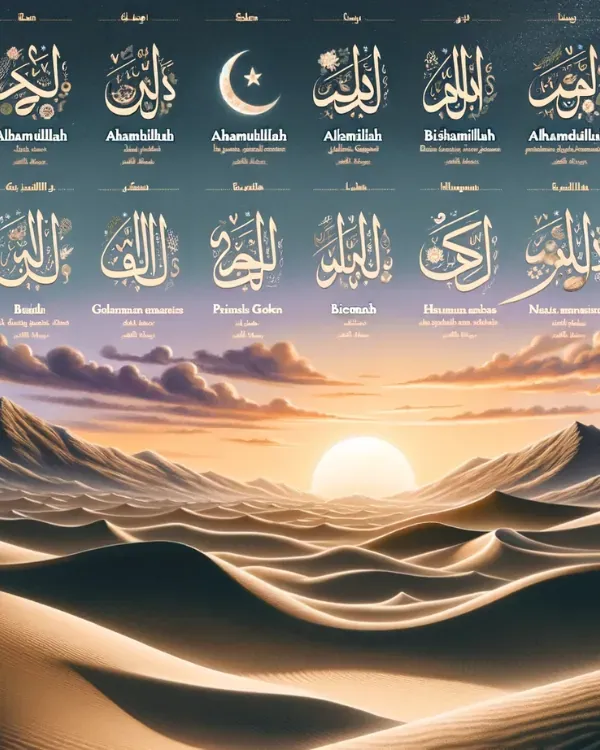
Advertisement
1. Bismillah-ir-Rahman-ir-Rahim
Meaning: "In the name of Allah, the Most Gracious, the Most Merciful."
Significance: This phrase is commonly used as the opening line in Muslim wedding cards. It signifies invoking Allah's blessings, grace, and mercy. Starting with this phrase is a way of acknowledging that every event and action begins with the blessing of Allah.
2. Dua (Blessings) for the Couple
Common Dua: "Barakallahu Lakuma wa Baraka alaikum" (May Allah bless you and shower His blessings upon you).
Significance: Including a Dua in the wedding card is a heartfelt way to pray for the happiness, prosperity, and lifelong companionship of the couple. It reflects the community's support and well-wishes for the newlyweds.
3. Surah Al-Fatiha
Meaning: The Opening Chapter of the Quran.
Significance: Often used in Islamic ceremonies, including it in a wedding card symbolizes the start of a new chapter in life. It's a prayer for guidance, mercy, and a prosperous life journey for the couple.
4. As-Salamu Alaikum
Meaning: "Peace be upon you."
Significance: This greeting in the wedding card extends a message of peace and goodwill to the recipients. It's a warm and respectful way to begin the invitation.
5. Masha'Allah
Meaning: "What Allah has willed."
Significance: Used to express appreciation, joy, praise, or thankfulness for an event or person. Including this phrase in a wedding card acknowledges and celebrates the union as a blessing from Allah.
6. Insha'Allah
Meaning: "If Allah wills."
Significance: This phrase is often used when referring to future events, indicating hope and prayer for the occurrence of the wedding as planned, under Allah's will.
7. Subhanallah
- Meaning: "Glory be to Allah."
- Significance: This exclamation, expressing awe or amazement, can be included to reflect the miraculous and wonderful nature of marriage as a divine gift.
Example of wording
Bismillah-ir-Rahman-ir-Rahim
With the blessings of Allah, the Most Gracious, the Most Merciful, we joyfully invite you to the wedding of our beloved children.
As-Salamu Alaikum
Dear [Guest's Name], We are delighted to announce the union of [Bride's Name] and [Groom's Name]. Join us in celebrating this blessed occasion as they embark on their new journey together.
Dua for the Couple: "Barakallahu Lakuma wa Baraka alaikum. May Allah bless you and shower His blessings upon you, guiding you to a life filled with happiness, love, and mutual respect."
Surah Al-Fatiha
As we start this new chapter in their lives, we pray for guidance, mercy, and a prosperous journey ahead, under the grace of Allah.
Masha'Allah, their union is a beautiful testament to the love and grace that Allah bestows upon us.
We look forward to celebrating this joyous occasion with you. Insha'Allah, we shall all gather on [Date] at [Venue] to witness their holy matrimony.
Subhanallah, we are endlessly grateful for this miraculous moment.
Warm regards,
[Family's Name]
Language and Tone
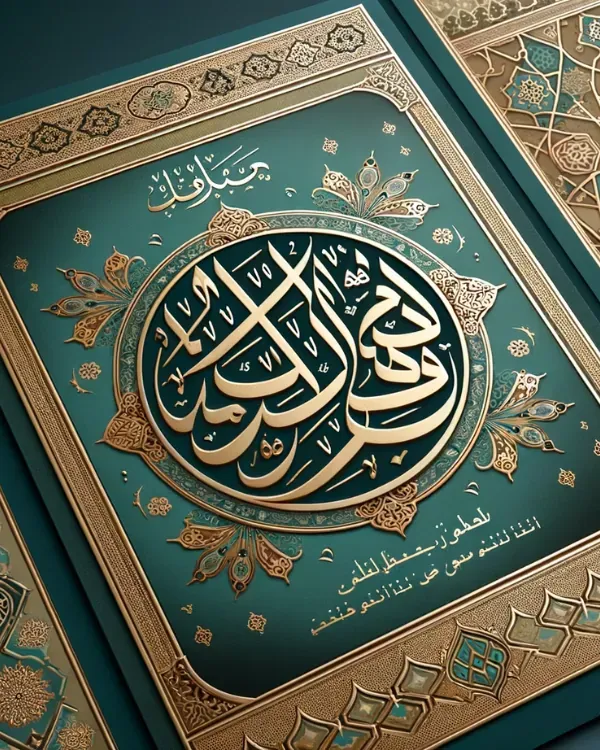
A. Formal vs. Informal Tone
| Tone | Characteristics | Wording Example |
|---|---|---|
| Formal | - Structured sentences - Respectful greetings - Adheres to cultural and religious norms | Bismillah-ir-Rahman-ir-Rahim With the blessings of Almighty Allah, we cordially invite you to the auspicious wedding of our daughter [Bride's Name] with [Groom's Name]. Barakallahu Lakuma wa Baraka alaikum We request the honor of your presence on [Date] at [Venue]. Kindly join us in this sacred celebration as we seek blessings for the couple's future. Warm regards, [Family's Name] |
| Informal | - Conversational language - Personalized messages - Relaxed approach | Hey there! We're super excited to tell you about [Bride's Name] and [Groom's Name]'s big day! It's happening, and we can't wait to celebrate with you. Join us for a lot of fun, laughter, and joy on [Date] at [Venue]. Hope to see you there for what's sure to be an amazing day! Cheers, [Your Name] |
This table illustrates the distinct differences in tone and style between formal and informal wedding card wordings, catering to different preferences and family traditions.
B. Choosing the Right Language
Language Selection: Opt for a language that all guests will understand. Common choices include Arabic for its religious significance, English for its global comprehensibility, or the local language to cater to specific cultural contexts.
Multilingual Options: Consider bilingual or multilingual cards if your guest list is diverse, ensuring everyone feels included and respected.
C. Respectful and Inclusive Language
Respectful Wording: Regardless of the tone, ensure the language used is always respectful, honoring the sanctity of the occasion and the guests' sensibilities.
Inclusivity: Be mindful of guests from different faiths or backgrounds. Choose words that are welcoming and inclusive, creating a sense of unity and celebration for all attendees.
Religious Verses and Quotes

Advertisement
Selection of Quranic Verses
Verses on Marriage and Blessings: Choose verses that celebrate marriage, such as Surah Ar-Rum (30:21) "And among His Signs is this, that He created for you mates from among yourselves, that ye may dwell in tranquility with them, and He has put love and mercy between your hearts."
Example: "We have created you in pairs" (Surah An-Naba, 78:8) can be included to signify the divine creation of marital unions.
Hadiths and Islamic Poetry
Hadiths on Love and Union: Select Hadiths that emphasize the importance of love and companionship in marriage. For example, Prophet Muhammad (PBUH) said, "The best among you are those who are best to their wives."
Islamic Poetry: Incorporate lines from Islamic poets that speak of love within the bounds of faith, such as Rumi's verses on spiritual companionship and eternal love.
Example of Rumi's Verse: "Out beyond ideas of wrongdoing and rightdoing, there is a field. I'll meet you there. When the soul lies down in that grass, the world is too full to talk about."
This verse by Rumi speaks to the deep, spiritual connection and understanding that transcends conventional notions of right and wrong, symbolizing the profound bond and eternal love that marriage within the Islamic faith embodies. It suggests a meeting place beyond worldly concerns, where two souls can connect in pure harmony, making it a fitting and poetic addition to a wedding card.
Guidelines for Using Religious Texts
1. Contextual Relevance: Ensure that the verses or Hadiths chosen are relevant to marriage and are used in an appropriate context.
2. Respect and Sensitivity: Handle religious texts with utmost respect. Avoid using verses in a way that could be misinterpreted or deemed disrespectful.
3. Cultural Considerations: Be aware of different interpretations and cultural sensitivities related to religious texts within the Muslim community. What might be acceptable in one culture could be sensitive in another.
Invitation Wording Structure
| Aspect | Traditional Format | Contemporary Format |
|---|---|---|
| Opening | "Bismillah-ir-Rahman-ir-Rahim" (In the name of Allah, the Most Gracious, the Most Merciful) | A personalized verse or quote that still reflects Islamic values |
| Introduction | Formal introduction with Quranic verse or blessing | Informal, personalized introduction with a modern touch |
| Names | Full names of the bride and groom, along with their parents' names | First names of the couple, possibly omitting parents' names for a more casual approach |
| Date and Time | Specific date and time, often including both Islamic and Gregorian calendar dates | Date and time presented in a creative manner, such as using graphics or unique fonts |
| Venue Details | Full address of the venue with clear instructions | Venue details with added creative elements like maps or illustrations |
| Closing | Traditional Dua or prayer for the couple | A modern, yet respectful closing phrase or blessing |
| RSVP Information | Formal request for RSVP with contact details | Casual RSVP request, possibly including digital response options like a wedding website or email address |
Examples:
Traditional Format Example:
- Opening: "Bismillah-ir-Rahman-ir-Rahim"
- Introduction: "We invite you to the blessed wedding of [Bride's Name], daughter of [Bride's Parents' Names], and [Groom's Name], son of [Groom's Parents' Names]..."
- Date/Time: "On [Date], at [Time]..."
- Venue: "[Full Venue Address]..."
- Closing: "May Allah bless this union..."
- RSVP: "Kindly respond by [Date]..."
Contemporary Format Example:
- Opening: "In the spirit of love and joy..."
- Introduction: "Join us for the special day of [Bride's First Name] and [Groom's First Name] as they tie the knot..."
- Date/Time: "Save the Date: [Date], Party starts at [Time]..."
- Venue: "Let's celebrate at [Venue], see you at [Address]..."
- Closing: "Together with our families, we invite you to share in our joy..."
- RSVP: "RSVP at [Wedding Website] by [Date]..."
This table and examples provide a clear comparison and guidance for creating either a traditional or contemporary Muslim wedding card, ensuring respect for cultural and religious norms while allowing room for personalization and modern expression.
Additional Elements
1.RSVP Information: Include RSVP details for proper planning and guest management.
2. Dress Code (if applicable): Mention the dress code if the wedding adheres to specific cultural or religious attire.
3. Separate Cards for Separate Events (Mehndi, Walima, etc.): Create separate cards for different ceremonies like Mehndi, Nikah, and Walima for clarity.
4. Directions and Accommodation Details (for Destination Weddings): For destination weddings, provide detailed directions and accommodation information.
Cultural Considerations
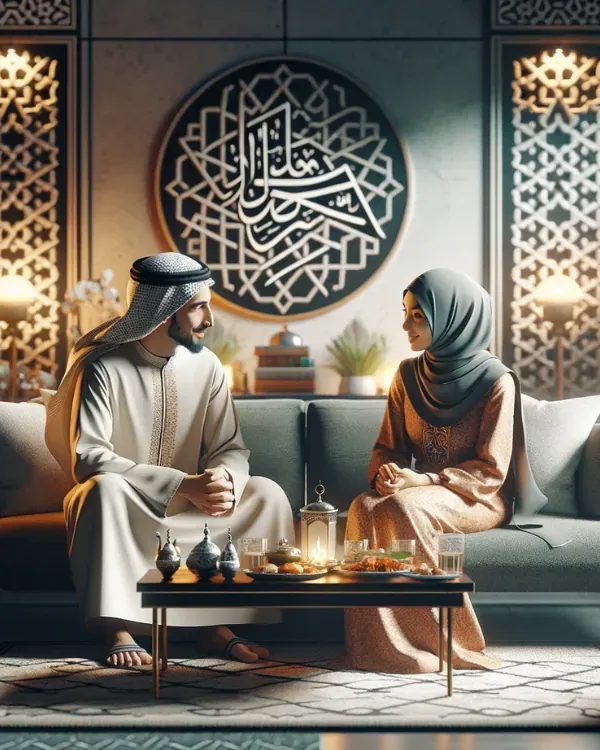
Advertisement
A. Regional Variations in Muslim Weddings
Understanding Diversity: Acknowledge the diversity in Muslim wedding practices across regions like South Asia, the Middle East, Africa, and Southeast Asia.
Reflecting in the Card: Tailor the card's wording and design to regional practices, such as including Mehndi or Nikah references for South Asian weddings.
B. Incorporating Local Customs
Personal Touch: Enhance the invitation with local customs, using traditional motifs, idioms, or greetings.
Balancing Act: Ensure local customs complement core Islamic values and the universal essence of marriage.
C. Multilingual Cards for Diverse Guests
Language Inclusion: Use multiple languages (Arabic, English, and a local language) for linguistically diverse guests.
Cultural Sensitivity: Ensure translations are accurate and culturally respectful, maintaining the message's consistency.
Customization and Personalization Tips
How to Reflect the Couple’s Style and Taste
Understanding the Couple: Get to know the couple’s preferences, personalities, and story. This insight can guide the theme and tone of the card.
Unique Elements: Incorporate elements that are uniquely representative of the couple - this could be through color schemes, graphics, or even a shared quote or motto.
Examples of Customized Text Wordings
For a Romantic Muslim Couple:
"In the blessed journey of love, [Bride’s Name] and [Groom’s Name] are weaving their lives together under the watchful eyes of Allah. Join us in celebrating their union, a beautiful tapestry of love and faith, on [Date]."
Adventure-Themed for Muslim Travel Lovers:
"Side by side, [Bride’s Name] and [Groom’s Name] have traveled paths of discovery. Now, they embark on life's greatest journey under Allah's guidance. Join us for a wedding that celebrates adventure and faith on [Date]."
Simple and Elegant for a Muslim Wedding:
"With hearts full of gratitude to Allah, we, [Bride’s Name] and [Groom’s Name], joyfully invite you to witness our union in the sacred bond of marriage on [Date]."
Culturally Rich for a Traditional Muslim Couple:
"Embracing the traditions of our forefathers and the blessings of Allah, [Bride’s Name] and [Groom’s Name] invite you to join their culturally rich wedding celebration on [Date]."
Modern and Minimalistic for a Contemporary Muslim Couple:
"In the name of Allah, the Most Gracious, the Most Merciful, [Bride’s Name] and [Groom’s Name] joyously announce their union. Join us for a modern celebration of love and faith on [Date]."
Humorous Tone for a Lighthearted Muslim Wedding:
"As Allah brought our hearts together, [Bride’s Name] has agreed to put up with [Groom’s Name]’s jokes forever. Join us for a wedding filled with laughter, love, and a touch of divine humor on [Date]."
Frequently Asked Questions
1. How can we incorporate both families' cultural backgrounds in a Muslim wedding card?
Answer: Blend elements from both cultures using bilingual text, shared motifs, and a mix of traditional designs. Ensure respectful representation by discussing and agreeing on these elements with both families.
2. Are there specific colors that should be used or avoided in Muslim wedding cards?
Answer: Generally, modest and elegant colors like cream, gold, and green are preferred. Bright colors are acceptable, especially in South Asian weddings, but overly flashy designs should be avoided.
3. Can we include modern graphic elements or photographs in a Muslim wedding card?
Answer: Modern graphics like abstract designs and floral patterns are acceptable. The use of photographs depends on individual preference and cultural sensitivity, with some families opting for modesty.
4. How do we address a mixed-faith guest list in the wedding card wording?
Answer: Use inclusive language that resonates with all guests. Phrases like "celebrate our union" are welcoming, and providing brief explanations of religious ceremonies can be helpful for non-Muslim guests.
Advertisement
I'm Looking For!
